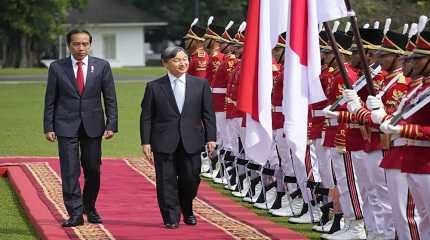
BOGOR, Indonesia (AP) — Japanese Emperor Naruhito met with Indonesian President Joko Widodo on Monday, the third day of his first official foreign trip since ascending the Chrysanthemum Throne in 2019.
Widodo and Indonesia’s first lady, Iriana, welcomed Naruhito and Empress Masako at the Bogor presidential palace, along with greeters wearing Indonesian traditional clothes and a military band that played both national anthems.
“I feel very honored because Indonesia is the first destination for the Japanese emperor’s bilateral state visit abroad,” Widodo said.
Naruhito is seeking to underline the friendship between Japan and Indonesia during his weeklong visit, and officials said the two leaders would talk about cooperation between the countries.
The emperor arrived in the capital Saturday and visited some places in the city, including a station of the Jakarta MRT, which is Indonesia’s first subway line and was financed by a loan from the Japan International Cooperation Agency.
Naruhito planned to visit Indonesia’s heroes cemetery in Jakarta on Tuesday.
For Wednesday, he has scheduled a trip to Yogyakarta, a city also on the island of Java that is the center of Javanese culture and a seat of royal dynasties going back centuries. He plans to go on Thursday to the Borobudur temple, the world’s largest Buddhist temple.
Naruhito said before leaving Japan that cooperation with developing countries is key to dealing with global challenges such as climate change, energy and food. His trip comes as Japan and the Association of Southeast Asian Nations mark 50 years of friendship this year, when Indonesia is serving as the ASEAN chair.
Japan is increasingly seeking to deepen ties with developing nations in tackling regional and global challenges. Japan is the largest provider of official development assistance to Indonesia, according to Japan’s Foreign Ministry.
Naruhito, 63, is Japan’s first emperor born after World War II, which was fought in the name of his grandfather, Emperor Hirohito.
Japanese troops occupied Indonesia, then the Dutch East Indies colony, from 1942 until Tokyo surrendered in August 1945.




